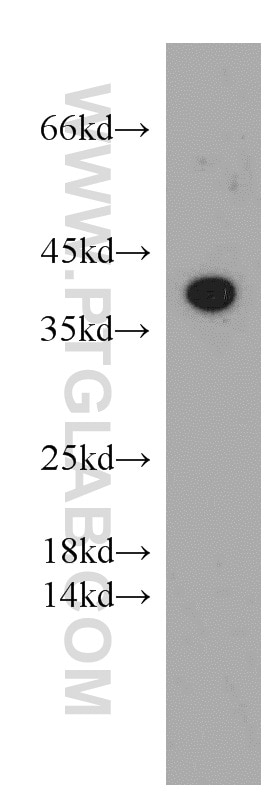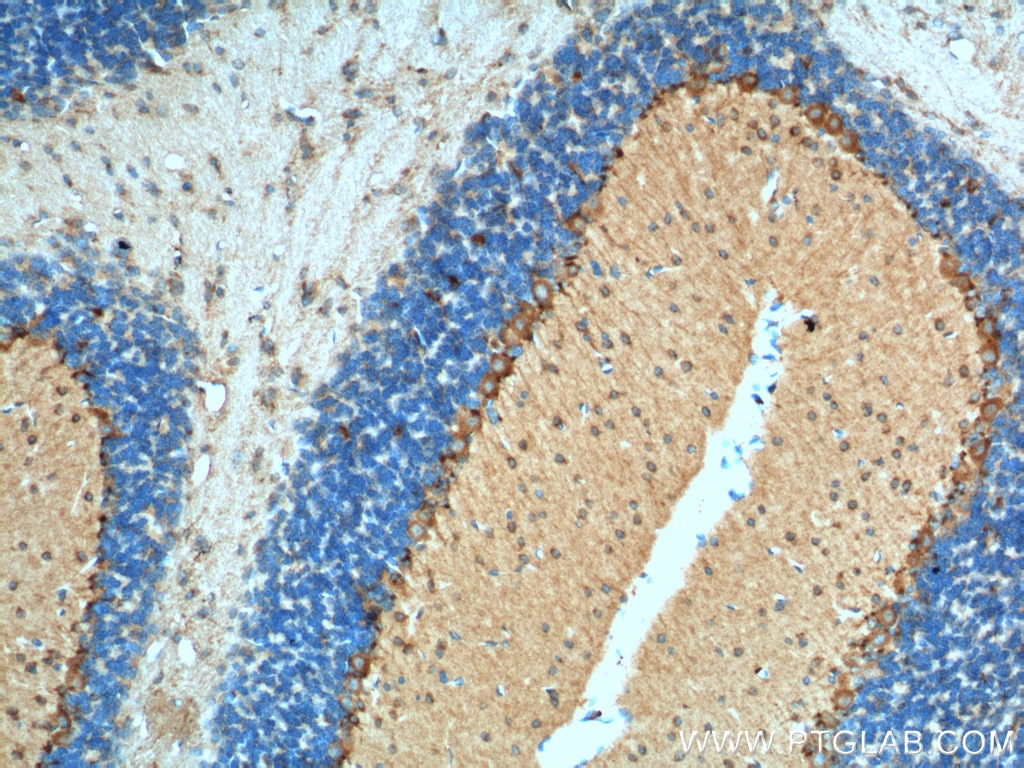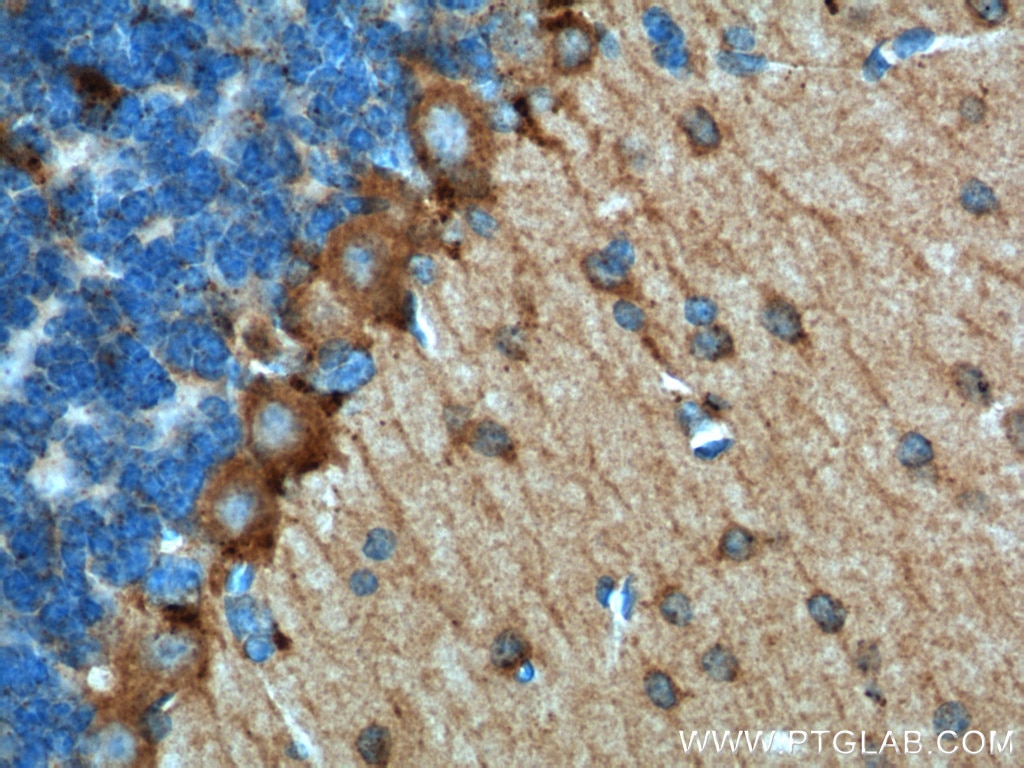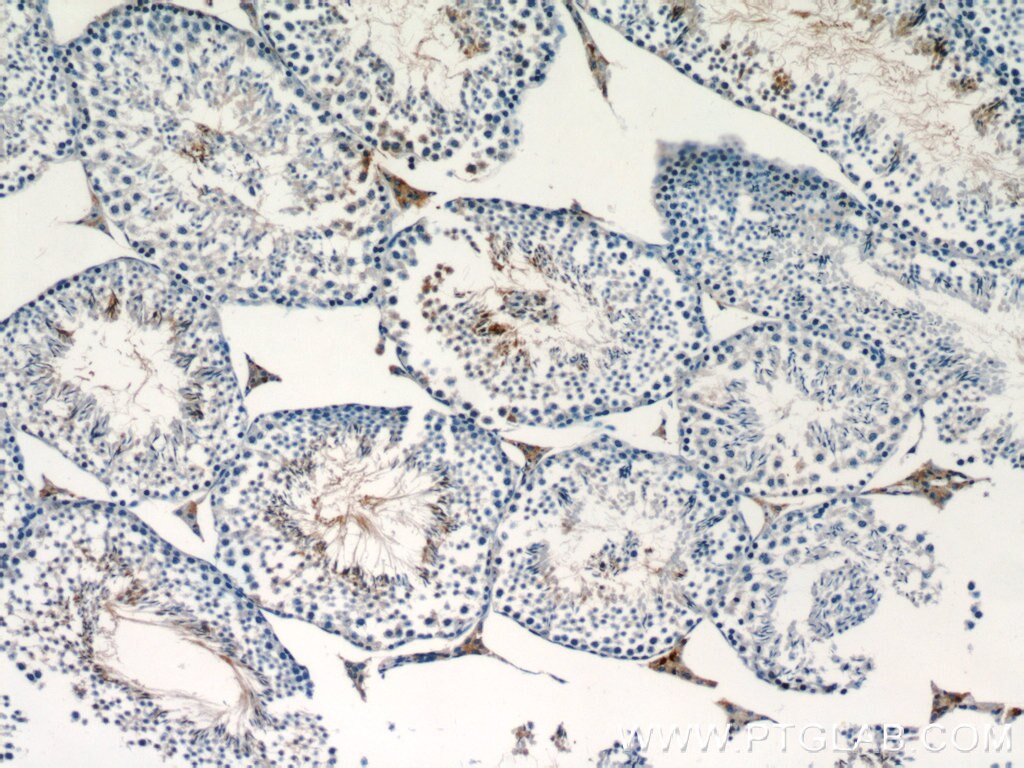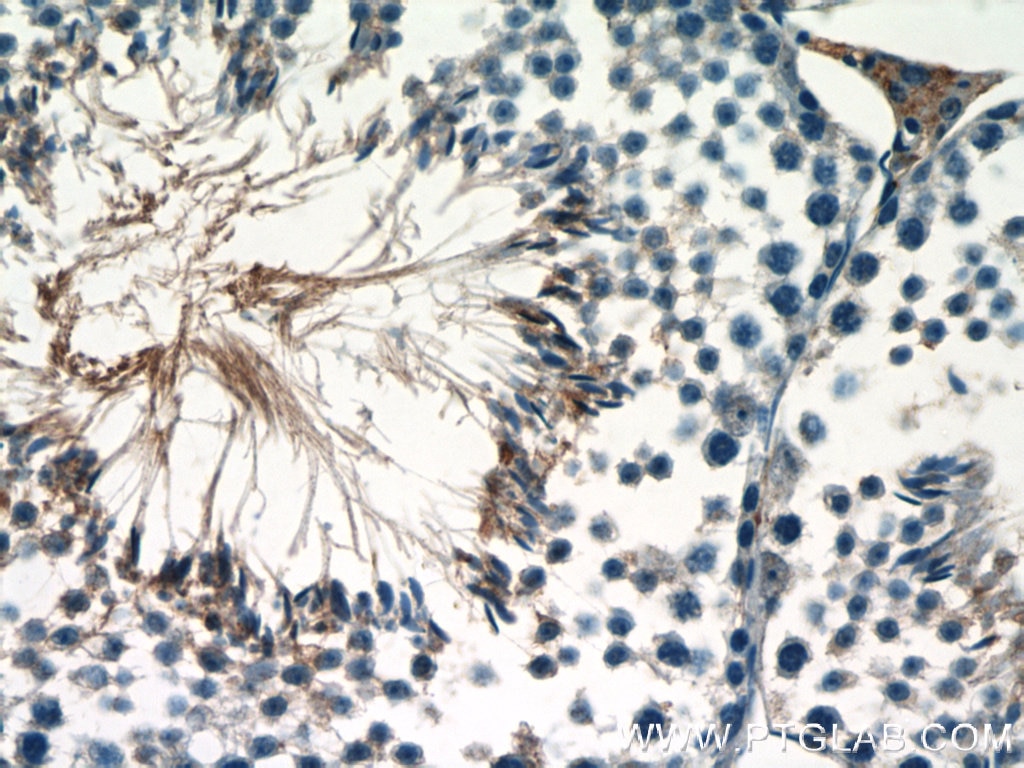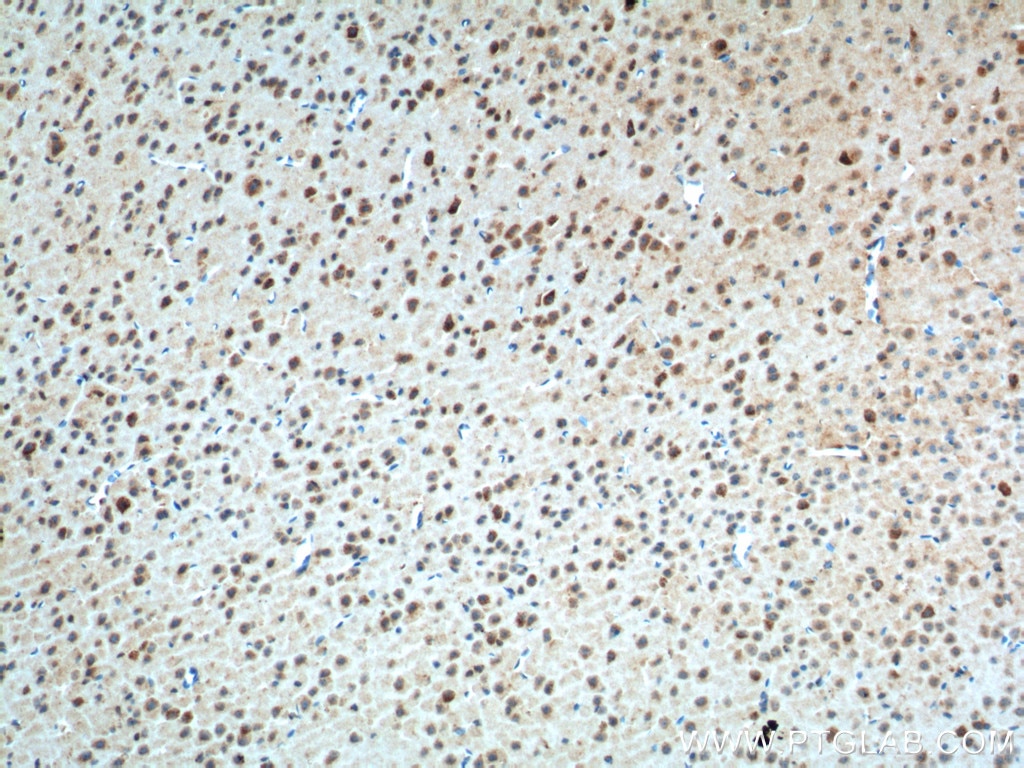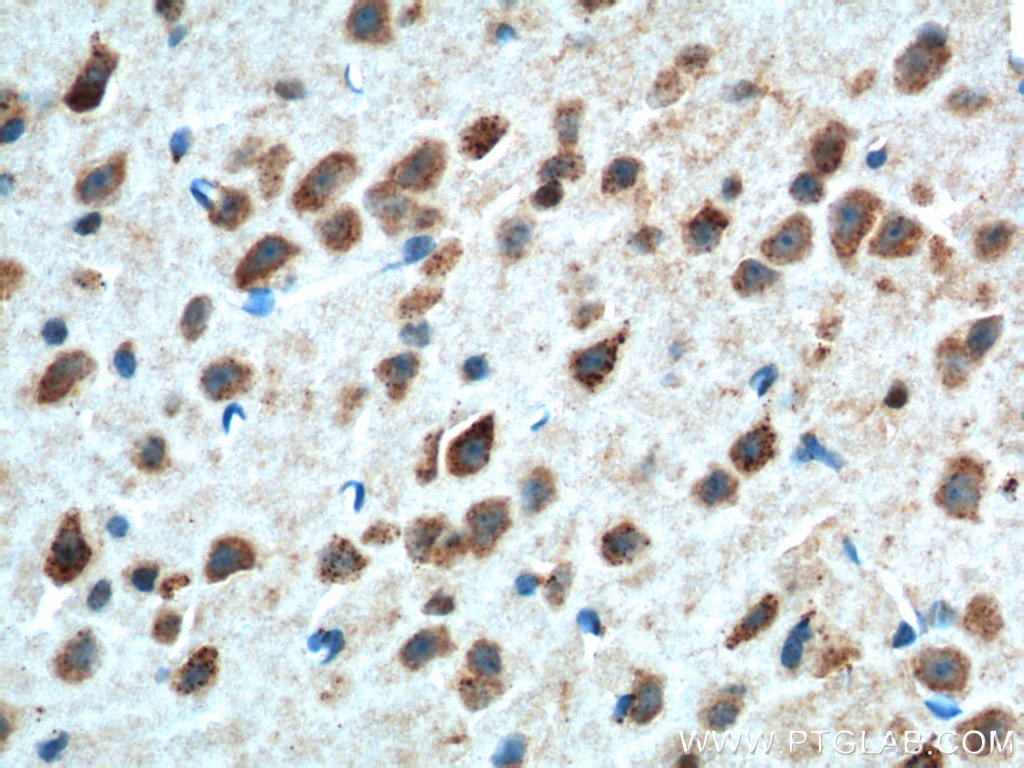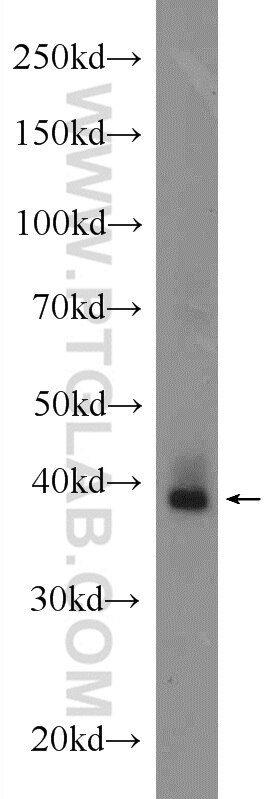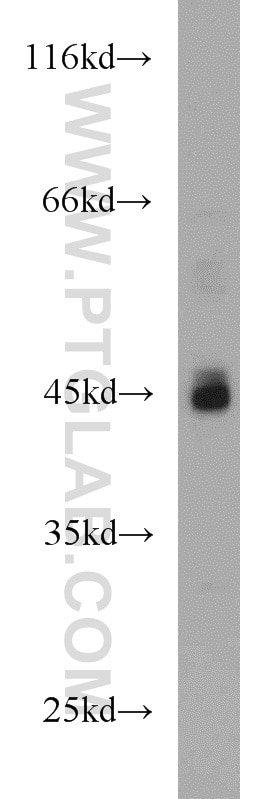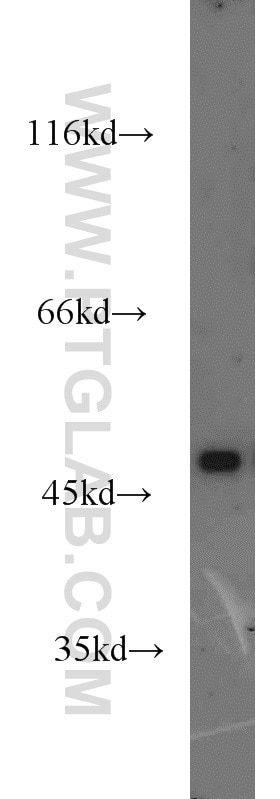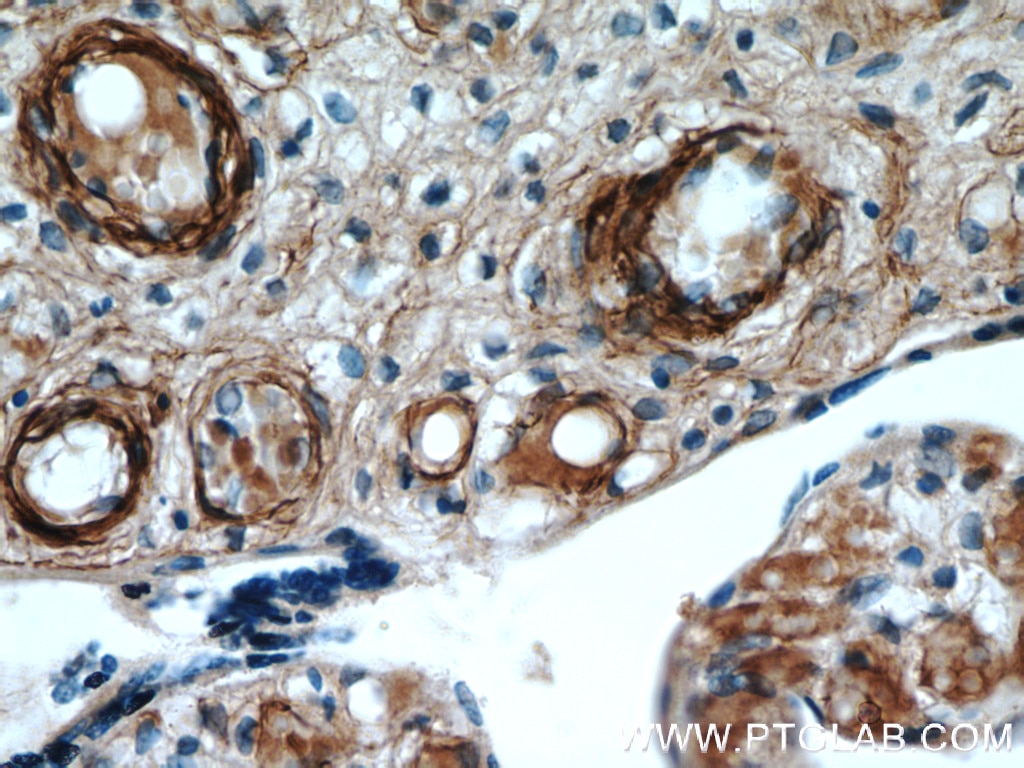Anticorps Polyclonal de lapin anti-Adenosine A1 Receptor
Adenosine A1 Receptor Polyclonal Antibody for IHC, WB, ELISA
Hôte / Isotype
Lapin / IgG
Réactivité testée
Humain, souris et plus (1)
Applications
WB, IHC, IF, ELISA
Conjugaison
Non conjugué
N° de cat : 55026-1-AP
Synonymes
Galerie de données de validation
Applications testées
| Résultats positifs en WB | cellules SH-SY5Y |
| Résultats positifs en IHC | tissu de cervelet de souris, tissu cérébral de souris, tissu testiculaire de souris il est suggéré de démasquer l'antigène avec un tampon de TE buffer pH 9.0; (*) À défaut, 'le démasquage de l'antigène peut être 'effectué avec un tampon citrate pH 6,0. |
Dilution recommandée
| Application | Dilution |
|---|---|
| Western Blot (WB) | WB : 1:500-1:1000 |
| Immunohistochimie (IHC) | IHC : 1:50-1:500 |
| It is recommended that this reagent should be titrated in each testing system to obtain optimal results. | |
| Sample-dependent, check data in validation data gallery | |
Applications publiées
| WB | See 5 publications below |
| IHC | See 1 publications below |
| IF | See 1 publications below |
Informations sur le produit
55026-1-AP cible Adenosine A1 Receptor dans les applications de WB, IHC, IF, ELISA et montre une réactivité avec des échantillons Humain, souris
| Réactivité | Humain, souris |
| Réactivité citée | rat, Humain, souris |
| Hôte / Isotype | Lapin / IgG |
| Clonalité | Polyclonal |
| Type | Anticorps |
| Immunogène | Peptide |
| Nom complet | adenosine A1 receptor |
| Masse moléculaire calculée | 37 kDa |
| Poids moléculaire observé | 37 kDa |
| Numéro d’acquisition GenBank | NM_000674 |
| Symbole du gène | ADORA1 |
| Identification du gène (NCBI) | 134 |
| Conjugaison | Non conjugué |
| Forme | Liquide |
| Méthode de purification | Purification par affinité contre l'antigène |
| Tampon de stockage | PBS avec azoture de sodium à 0,02 % et glycérol à 50 % pH 7,3 |
| Conditions de stockage | Stocker à -20 ℃. L'aliquotage n'est pas nécessaire pour le stockage à -20oC Les 20ul contiennent 0,1% de BSA. |
Informations générales
Adenosine A1 receptor (ADORA1, also known as A1AR) is one of four subtypes of adenosine receptors that belong to a superfamily of protein G-coupled receptors. Adenosine is produced in response to trauma, ischemia, and hypoxia and plays an important role in preventing excessive tissue damage.
What is the molecular weight of adenosine A1 receptor? Are there any isoforms of ADORA1?
The molecular weight of adenosine A1 receptor is 32-37 kDa. ADORA1 forms homodimers that can be stable in denaturing condition running as a ~64 kDa species in western blotting (PMID: 19558453). Alternative splicing resulting in two isoforms has been reported (PMID: 8300646).
What is the tissue expression of adenosine A1 receptor? What is the subcellular localization of ADORA1?
Adenosine A1 receptor is expressed in various organs, with very high expression in the central nervous system (mainly in the cortex, cerebellum, and hippocampus but also by microglia, astrocytes, and oligodendrocytes), adrenal gland, and atrium (PMID: 11734617). Adenosine receptors, including A1 receptor, are integral membrane proteins that reside at the plasma membrane.
What is the role of adenosine A1 receptor in health and disease?
Adenosine is an important neuromodulator influencing synaptic plasticity and the release of neurotransmitters, in addition to working as a neuroprotective agent against oxidative stress - all of these functions are mediated by adenosine A1 receptor, whose expression levels are increased upon stress. Adenosine A1 receptor has been shown to control sleep; ADORA1 levels increase during sleep deprivation and promote sleep (PMID: 9157887, 17329439). Additionally, adenosine A1 receptor regulates vascular tension by contraction, antagonizing the activity of adenosine A2 receptor (PMID: 15539423). A number of selective agonists and antagonists of adenosine receptors have been developed to study their biology and are now drug candidates in the clinic (PMID: 19639277).
Protocole
| Product Specific Protocols | |
|---|---|
| WB protocol for Adenosine A1 Receptor antibody 55026-1-AP | Download protocol |
| IHC protocol for Adenosine A1 Receptor antibody 55026-1-AP | Download protocol |
| Standard Protocols | |
|---|---|
| Click here to view our Standard Protocols |
Publications
| Species | Application | Title |
|---|---|---|
Antioxidants (Basel) Activation of Adenosine A1 Receptor in Ischemic Stroke: Neuroprotection by Tetrahydroxy Stilbene Glycoside as an Agonist. | ||
J Nutr Biochem Disruption of hepatic one-carbon metabolism impairs mitochondrial function and enhances macrophage activity in methionine-choline-deficient mice. | ||
Bioorg Med Chem Unraveling the mechanism of alkaloids from Sophora alopecuroides Linn combined with immune checkpoint blockade in the treatment of non-small cell lung cancer based on systems pharmacology. | ||
Anat Rec (Hoboken) Adenosine A1 Receptor mRNA Expression by Neurons and Glia in the Auditory Forebrain. | ||
J Ophthalmic Vis Res Adenosine Receptors Expression in Human Retina and Choroid with Age-related Macular Degeneration |
Avis
The reviews below have been submitted by verified Proteintech customers who received an incentive forproviding their feedback.
FH Brandon (Verified Customer) (10-31-2019) | 40 ug protein was transferred to a PVDF membrane and blocked in 5% milk in TBST for 1 hour before overnight incubation with 1' antibody diluted in 1% milk in TBST. Anti-rabbit HRP secondary antibody diluted 1:3000 in 5% milk was used for detection by chemiluminescence.The band did not show up when transferred to a nitrocellulose membrane and I noticed several non-specific bands
|
